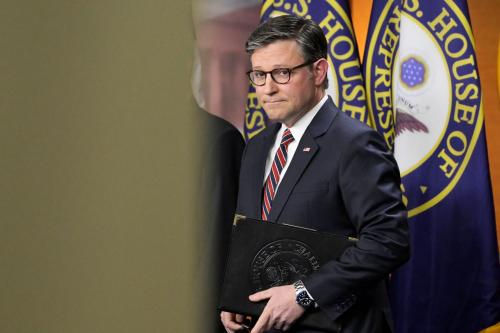Nearly seven months into the Bush administration, fewer than half of the Cabinet and sub-Cabinet vacancies in the government have been filled. Fast as they think they are going—and it is pretty fast by recent standards—the Senate and White House are still at least six months from finishing the long list of appointments.
Loath to give up a single political appointment, the White House will be making nominations until late fall. Loath to give up one confirmation hearing, the Senate will be processing confirmations past the first anniversary of the president’s inauguration.
Counting Cabinet and sub-Cabinet positions only, the Bush administration had 227 positions confirmed as of Aug. 3 and another 265 to fill. Of those 265, 55 were still awaiting confirmation when the Senate left town, another 30 had been announced but not formally nominated, and 180 had yet to be announced. Obviously, the Senate cannot confirm appointees who have not been nominated, and the White House cannot nominate candidates who have not been selected.
One doesn’t have to look far to identify key vacancies. The nation is entering a debate about the future of Social Security without a Social Security commissioner; one has been nominated but not confirmed. It is entering the hurricane and fire seasons without a National Oceanographic and Atmospheric Administration chief; without a deputy director and associate director for preparedness of the Federal Emergency Management Agency; and without a Federal Insurance Administration head or an administrator of the U.S. Fire Administration—none of whom has been announced by the White House.
It is continuing its debate on the future of stem cell research without a presidential science adviser (who has been announced but not nominated), and without a director of the National Institutes of Health or commissioner of food and drugs, both of whom have yet to be announced. It is moving forward with energy legislation without an administrator of the Energy Information Administration; with no assistant secretaries of energy for fossil energy or for environment, safety, and health; and with no assistant secretary of Interior for land and minerals management—none of whom has been announced.
It is moving ahead with conversations about Alaskan oil drilling without a director of the U.S. Fish and Wildlife Service or an assistant secretary of the interior for fish, wildlife and parks, both of whom have been announced but not nominated, and without a director of the office of surface mining reclamation (nominated but not confirmed).
It is having a debate about the safety of Mexican trucks on U.S. roads without an administrator of the Federal Highway Administration, a chairman of the National Transportation Safety Board or an administrator of the Federal Motor Carrier Administration, all of whom have been nominated but not yet confirmed.
Finally, the president’s team at the Office of Management and Budget has launched a massive effort to contract out hundreds of thousands of federal jobs without dozens of key management officials in place, including chief financial officers at a half-dozen departments, as well as the deputy director for management of the Office of Management and Budget.
To be fair, the Democrats, during their first four weeks in control of the Senate, confirmed about four times as many appointees per week as their Republican colleagues did during the winter and spring. The administration, counting every nomination it has made, including Cabinet, sub-Cabinet, U.S. attorneys, U.S. marshals and ambassadors, has out-nominated the Reagan administration by 13 percent.
Indeed, the Senate and White House may be moving at what they see as a record-setting pace. But it is not fast enough.
Instead of congratulating themselves on outrunning glaciers, the Senate and White House should use the summer recess to hammer out an agreement so that no administration has to go through this process again. That would mean paring down the paperwork and making it all available online, getting rid of ridiculous questions and inquiries into ancient history by the FBI and White House, and streamlining the financial disclosure process. That would also mean cutting the number of positions that require FBI full-field investigations, reducing the positions that require Senate confirmation hearings, and flattening the bloated political hierarchy of Senate and non-Senate confirmed jobs.
If legislation accomplishing all this were introduced, passed and signed into law by Nov. 1, this Congress would be the first in 50 years to actually improve the process. That would be a pace worth celebrating.
Paul C. Light is Vice President and Director of Governmental Studies at the Brookings Institution and Senior Adviser to The Presidential Appointee Initiative.
The Brookings Institution is committed to quality, independence, and impact.
We are supported by a diverse array of funders. In line with our values and policies, each Brookings publication represents the sole views of its author(s).



Commentary
Op-edThe Confirmation Crawl
August 10, 2001